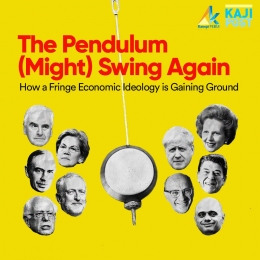To hijack the economy, NEM needed a radical rediscovering political power in government. Britain's NEM found fertile ground in Jeremy Corbyn's Labour Party while America's NEM gains ground in the Progressives of the Democratic Party. If elected, both will want to swing the pendulum back to the left.
"Fundamental Rework of Capitalism": Changes it Would Carve
For swinging the pendulum, they are following one clear aim: redistribute economic power within society. Everyone will get equal shares of the pie. Thus, it requires a fundamental rework of capitalism, where they need an interventionist government. Next, their intervention should create these changes (New Economics Foundation [NEF], 2018:6-9).

Even more than that, NEM's stimulus is different from the IMF's temporary stimulus (2018:2). In their own words, NEF said that they need them to create this (NEF, 2018:6):
"New fiscal rules that shift the focus from managing public debt to using up fiscal space to steer and drive structural change in the economy."
It means that NEM wants a permanent stimulus to "steer structural change". But, the IMF advocate for a temporary stimulus by infrastructure spending and structural reforms (IMF, 2018:2). In other words, NEM wants permanent use of that space to advance their political goals. They want to wage a permanent fiscal revolution. Managing public debt? Scrap it!
Then, government-led green initiatives would create a myriad of bureaucratic environmental bodies. This bureaucracy makes those initiatives less responsive to environmental demands.
Eastern Bloc nations' experience with bureaucracy's effect on the environment might teach them something. But, the most horrendous effect would come from NEM's policies for more workers' power.
Their "Inclusive Ownership Fund" draws striking resemblance with Sweden's "Wage-Earner Funds". Introduced in 1984, it "basically buy the companies with the companies' own money," said Carola Lemne, one of Sweden's leading industrialist. Instead of increasing worker's power, it scared many entrepreneurs. They withheld their investments and halt expansion. Even companies like IKEA moved out. Finally, the Swedish government dissolves this scheme in 1991 (Meidner, 1993:225).
In essence, NEM is an attempt to revive past failures under sophisticated packaging, which gains ground with the masses. If it remains this way, the Neoliberal establishment would lose. Thus, the present order needs to respond with renewed vigor and innovation. But, how to renew both? Governments must implement Popular Capitalism.









